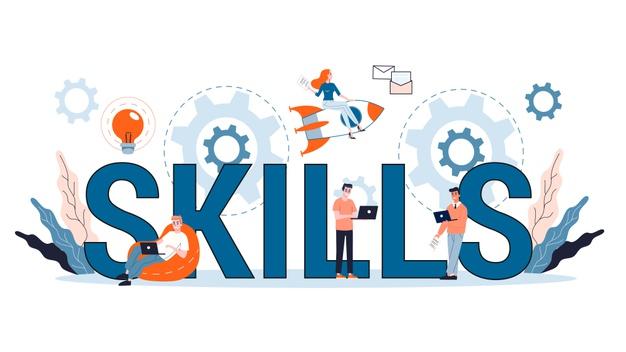Familiarity With Soft Skills And Skills Portfolio – Skill Portfolio And Skill Certificate
In The Note Of The Previous Issue, I Talked About Soft Skills And Skills Portfolio. Soft Skills Are Those Non-Technical Skills That Mainly Relate To Understanding And Managing Our Emotions, Understanding The Emotions Of Others, How We Interact With Others, and How To Solve Problems, And Similar Issues.
Having or improving soft skills can be seen as a factor in people’s success in work environments and family and social occasions. Soft skill is a skill that can transfer from one place to another.
Regarding the skills portfolio, I also mentioned that the set of skills that we need for our life and work is called the skills portfolio and consists of four skills: specialized skills, basic life skills, personal and personality skills, and social skills.
Specialized or complex skills are those we usually learn in universities, schools, or professional institutes, and our job is based on them. The other three categories of skills can be called soft skills. Employers are looking for a suitable combination of both soft and hard skills.
But how and based on what criteria can we form or develop our skills portfolio? I will try to mention some of these factors.
- Education and experiences: First, we should refer to our education and life experiences. What you studied and how many hours of training you got in that field are among the main factors in choosing the skills you include in your skills portfolio. We do not choose our field of study based on luck; Although some of us may make a mistake in selecting an area or determining our talent, especially in our teenage years, most people, by themselves or with the help of others, try to choose a field of study that is relatively close to their talents.
Sometimes your field of study is one thing, but your life experiences are somewhat different. For example, I studied sociology in my undergraduate course, but at the same time and even before that, my most significant interest and studies were in psychology. Later, I also chose the field of psychology for my graduate studies. Psychology has been of particular importance to me from the beginning. Therefore, having interest and enthusiasm is one of the factors in choosing a skill, and you can track your interests over time to find out this factor.
-
Current job or activity: Pay attention to your current position and the work you do in this job. Your job did not come your way by accident. Find out what it is about the job that draws you to it. Understanding this can help you choose the skills you need.
-
Being better: You have had relationships with friends, colleagues, and relatives over time, things have happened to you, you have read books, you have seen movies, and you have learned many things from these relationships and events. Over time, you’ve noticed that you’re better at some things than others. Pay attention to these things. The soft skills you want to include in your skills portfolio will come from these experiences.
-
Motivation: When you are motivated towards something, you naturally think about it, read, watch movies, and everything related to it becomes attractive to you. See which of the jobs and skills.
-
Benefits: You should be able to benefit from your skills. These interests can be material, such as rights and benefits, or immaterial, such as social status. It would be best to determine which area of your life benefited or increased after learning a skill. Learning a skill that does not solve a problem for you, your family, your company, or society and does not remove a burden from your shoulders is a waste of time and energy.
-
Expert help: To complete your skills portfolio, you need to know which skills. It is better to get help from a career counselor or psychologist.
-
To understand in which areas you have talent, interest, or ability. An expert will help you by reviewing the things you have done so far or are willing to do and doing some tests.
-
Tests: A set of several tests recognizing academic or professional talents and general intelligence or multiple intelligences can help you find many of your skills and abilities. Edgar Schein’s career anchors test 1 is one of the tests that divides the set of interests or skills of people into eight anchors and determines the best anchors of the examinee. The Holland aptitude test is also a tool widely used today, even at high school levels, to discover people’s talents and enthusiasm. This test finally divides people into six categories, each of which has its characteristics. General intelligence tests like the Raven IQ test help you determine your general intelligence or IQ score. But Gardner’s multiple intelligence test 2 doesn’t just measure your IQ; asking questions measures your primary field of passion or talent among several areas. The bar-an emotional intelligence test is another test that measures your dynamic intelligence score. The DISC test, the Minnesota job satisfaction test, the Johnson O’Connor test, and the Clifton talent finder test are other tests that can help you find talent.
Certificate of skill
To distinguish any skill from another skill, you must prepare a birth certificate for that skill. What is a birth certificate? Our birth certificate usually contains the date of birth, parent’s names, children’s names, place of birth, and other such topics. The birth certificate of skill is also something like our birth certificate.
It is mentioned which family or group of skills. For example, listening skills are from the family of communication skills, or problem-solving, and decision-making is considered from the group of analytical skills.
One of the essential points about the skills you choose is the scope of that skill. Usually, skills are part of a more prominent family, and sometimes, they are divided into several subcategories.
Make sure that your chosen skill does not have many subcategories and cannot be divided into several other skills; Because each of them is a different skill and require time to learn.
Communication skill itself is divided into several other skills, including presentation skills, speaking, persuasive skills, message transfer skills such as speaking and body language, message receiving skills such as active listening, observing, and responding, and all kinds of skills that arise in work and written relationships. Therefore, they cannot be included as a skill in your skills portfolio. For example, consider communication skills or digital skills.
Naturally, you can not have all these skills selected under a skill.
Consider digital literacy. On the one hand, this skill includes all kinds of basic skills, such as working with computers, mobile phones, etc., and familiarity with editing or graphic and straightforward office software.
Also, searching on the Internet, creating an account, working with social networks, applying for a job on the Internet, etc.; At the other end of the spectrum is content creation for the Internet and social networks, SEO operations for Internet content, using the Internet and social networks as marketing tools, coding a website, and designing a product or digital service. (I’ll write a separate article or articles about digital skills soon.) So you need to pick one skill that can’t break down into too many skills.
Another critical point is the relationship and effect of skills on each other. If the skill you learn reinforces another skill you already have, your skillset will become complete and substantial. Suppose you understand the skill of active listening. In that case, you will become more expert in negotiation skills because active listening to the negotiator can significantly increase the probability of agreement and reaching a common point.












